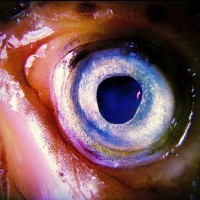Humour and horror fuse in this adaptation of the Lovecraft classic. Presented by Hidden Basement in association with the London Horror Festival.
Horror is a tricky genre to define. Ask any twenty-something what horror is, and inevitably their first thought will be of the modern horror film, designed purely to make audiences squeal, squirm and scream at the image of some freaky little child or mutated zombie out to get the lead character. This notion is more about terrifying visuals that ingrain themselves into the mind of the audience and quick scares that have little build-up. Usually, the films will have little in the way of emotional investment.
Horror literature, on the other hand, seems to be something quite different. For an accurate definition, I looked to the Horror Writer’s Association:
“Horror can deal with the mundane or the supernatural, with the fantastic or the normal. It doesn’t have to be full of ghosts, ghouls, and things to go bump in the night. Its only true requirement is that it elicit an emotional reaction that includes some aspect of fear or dread.”
As children, our fears might be grounded in those more supernatural elements. As adults however, our fears become more complex and grounded in real events – death, illness, loss of power. As the Horror Writer’s Association goes on to say, “Horror, by nature, is a personal touch — an intrusion into our comfort levels. It speaks of the human condition and forcibly reminds us of how little we actually know and understand.”
In ‘The Shadow Over Innsmouth,’ the element of horror seems to be grounded in Lovercraft’s own (documented) adult fear regarding interracial marriage and procreation. I won’t get too much into that… Anyhow, this fear manifests in the form of Robert Olmstead, who finds himself in Innsmouth, ultimately discovering his own genealogical connection with a race of underwater amphibians who can mate with humans.
In this play adaptation of the novel, I found a very different form of fear prevailed, one that is not so uncommon in society now. Philip North’s Robert seemed to me to be terrified of marriage: of physical intimacy and commitment to his soon-to-be-wife (Jade Allen, who also took on a multitude of other roles.)
While the play also weaved in an element of the supernatural – using puppets to portray a rather freaky bus driver and one of the amphibians – the overall mood that prevailed was comedy. Rather than taking away from this being a ‘horror’ show, I found the humour complementary and quite refreshing. I didn’t feel that this was a story which would ever, in any way, fill me with fear: rather, it took a couple of adult fears (both Lovecraft’s and Robert’s) and held them up under a microscope. That the resulting mood was comic perhaps is a reflection of the ridiculousness of what frightens us as adults.
As a work-in-progress, this production seemed to me to be quite near to completion. In a post-show Q & A, the actors commented that perhaps they would like to see the show extended and production values taken further. However, it felt to me that the production sat well as a short piece, perhaps as one half of a double bill. The design of the show too was clever, using nothing but a couple of clothing airers and a washing line, which were used in a number of ways to indicate a change of setting. The ‘haphazard’ design, as described by the creatives themselves, worked beautifully in the black-box setting of the Etcetera, and as with extending the show length, I feel pushing out this design into bigger production values would take away from show’s charm. It feels like a suitcase show that could easily be taken on tour to any of the hundreds of small theatre venues that exist across the UK.
The performances from North and Allen were both strong in their comic timing. Allen impressed in her transformation between a variety of characters and some quite hilarious accent work. North’s expressions and physicality at some points vividly conjured up memories of Rowan Atkinson as Mr. Bean. It was clear from the get-go that the two performers stood on the same level, and had an ease about their performance that can only come after years spent working together.
An element for the creatives to consider going forward may be the pacing of the show. Within the first 20-30 minutes, the performers built up a strong pace, keeping scenes short and sharp, aided by excellent comic timing. Due to this established flow, it then became a little harder to focus when the action was interjected with longer scenes – for example, one between Robert and Zadok, who tells us more about the underwater race. Perhaps it is in the more ‘intense’ scenes that some sort of compromise must be found, in order to keep both the moodier atmosphere and the snappy timing that these performers excel in.
I’m certainly intrigued to see where this production will go next. For a work-in-progress, it was impressively well-formed, and I do hope it will maintain the ‘pack up and go’ aesthetic that worked so well in this incarnation. Hidden Basement have shown us that horror manifests in many forms, particularly in our adult lives. As someone who’s no fan of ‘Paranormal Activity’, I rather enjoyed this different take on what it means to be horrified – be it by marriage or monsters.
